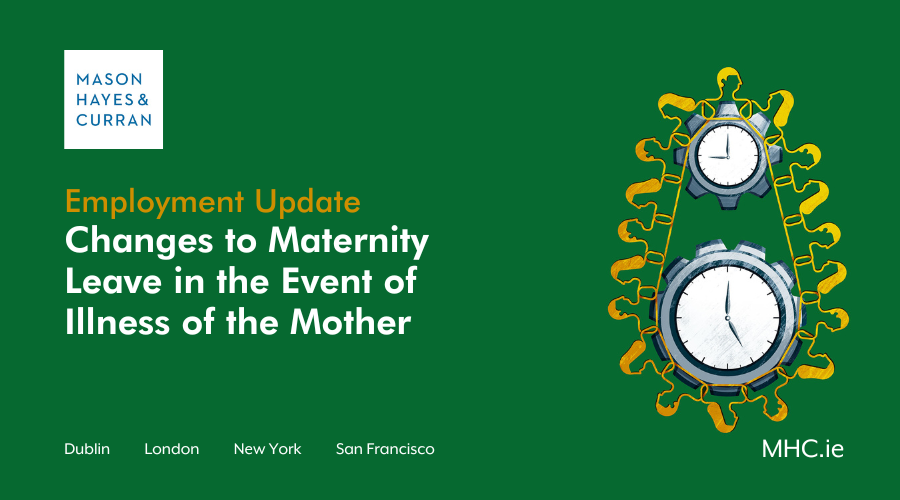Changes to Maternity Leave in the Event of Illness of the Mother

A recent groundbreaking change to Irish employment law means that employees can now postpone maternity leave for up to 52 weeks in cases of serious illness. Our Employment Law & Benefits team explores the implications for employers, and sets out practical steps to prepare for these transformative changes.
The Maternity Protection, Employment Equality and Preservation of Certain Records Act 2024 was recently signed into law. The Act allows employees to postpone maternity leave for between 5 to 52 weeks upon certification from their doctor.
Postponement of maternity leave in event of serious health condition
Currently, maternity leave can only be postponed if the child is hospitalised. This means that employees on maternity leave who suffer with a serious illness, such as cancer or mental illnesses, lose the benefit of their statutory maternity leave while undergoing treatment for the illness. The Act will ensure that those affected will no longer be required to use maternity leave during their treatment.
The Act provides that any employee who is pregnant or on maternity leave and has a serious health condition can notify their employer that they intend to postpone the commencement of all, or part, of their maternity leave for up to 52 weeks. A serious health condition is a condition that poses a serious risk to the life or health, including mental health, of the employee and requires necessary medical intervention that is ongoing.
An employee’s notification must include:
- The proposed commencement date
- The proposed end date, which must be at least five weeks from the commencement date, and
- A medical certificate signed by a relevant medical practitioner specifying the proposed commencement and end dates
The notification must be made at least two weeks before the postponement is due to commence.
Once the notification has been made as outlined above, the employee is entitled to the maternity leave, including any remaining portion, to be taken in one continuous period on the day immediately after the end date. The entitlement to resumed leave is subject to the employee notifying the employer in writing. The employee must indicate their intention to commence the maternity leave as soon as reasonably practicable but no later than the date on which the leave begins.
An employee who has already postponed their maternity leave may submit one further application to postpone their leave by up to 52 weeks.
Tips for employers
Employers should review their maternity leave policies to make provision for the new changes. HR teams are advised to familiarise themselves with the new legislation as they will need to be able to process requests and understand the various formalities such as notification and certification requirements.
For more information and advice on these changes, please contact Melanie Crowley or Elizabeth Ryan from our Employment Law & Benefits team.
People also ask
What will the Act change? |
The Maternity Protection, Employment Equality and Preservation of Certain Records Act 2024 will allow employees to postpone maternity leave for between 5 to 52 weeks in order to attend to their own medical needs. |
Does sickness affect maternity leave? |
The Act provides that any employee who is pregnant or on maternity leave and has a serious health condition can notify their employer that they intend to postpone the commencement of all or part of their maternity leave for up to 52 weeks. |
What are the criteria for making a notification under the Act? |
An employee’s notification must include:
|
The content of this article is provided for information purposes only and does not constitute legal or other advice.
Share this:





